Bad breath in dogs, often referred to as “doggy breath,” is more than just an unpleasant odor; it can be a sign of underlying dental issues. While regular brushing is ideal, not all dogs tolerate it well. Fortunately, the market offers a variety of effective dog dental chews designed to combat bad breath, reduce plaque, and promote overall oral health. As experts in canine care and editors for “Dog Care Story,” we’ve curated a list of the Best Dog Dental Chews For Bad Breath, focusing on ingredients, effectiveness, and your dog’s enjoyment.
Understanding Dog Bad Breath
Halitosis in dogs stems from a buildup of bacteria in the mouth. These bacteria produce volatile sulfur compounds, leading to that tell-tale foul odor. Common causes include:
- Plaque and Tartar Accumulation: Similar to humans, if plaque isn’t removed, it hardens into tartar, creating a breeding ground for bacteria.
- Gum Disease (Periodontal Disease): This is a serious condition that affects the tissues supporting the teeth and can lead to tooth loss and systemic health problems.
- Dietary Factors: Certain foods can contribute to bad breath.
- Underlying Health Issues: In some cases, persistent bad breath can indicate medical conditions like kidney disease, diabetes, or gastrointestinal problems.
This is why choosing the right dental chew is crucial, not just for a fresher scent but for your dog’s overall well-being.
Top Picks for Best Dog Dental Chews for Bad Breath
To help you navigate the options, we’ve evaluated several leading dental chews. Our selection prioritizes products that offer superior cleaning action, beneficial ingredients, and are well-received by dogs.
1. BARK Bright Dental Kit: The Innovative No-Toothbrush System
The BARK Bright Dental Kit stands out for its unique approach, combining a specially designed dental chew with a triple-enzymatic toothpaste. The star-shaped chew features a groove into which the toothpaste is squeezed. As your dog chews, they not only mechanically scrub their teeth but also distribute the toothpaste, allowing its enzymes to break down plaque-causing bacteria effectively.
This kit is developed with insights from Novozymes, a Danish biotech company, ensuring advanced enzymatic action. The chews are made with real chicken, and the ingredients are sourced from the USA and Denmark, with manufacturing taking place in the USA. Each kit provides a month’s supply of both chews and toothpaste, offering a convenient and comprehensive solution for busy pet parents.
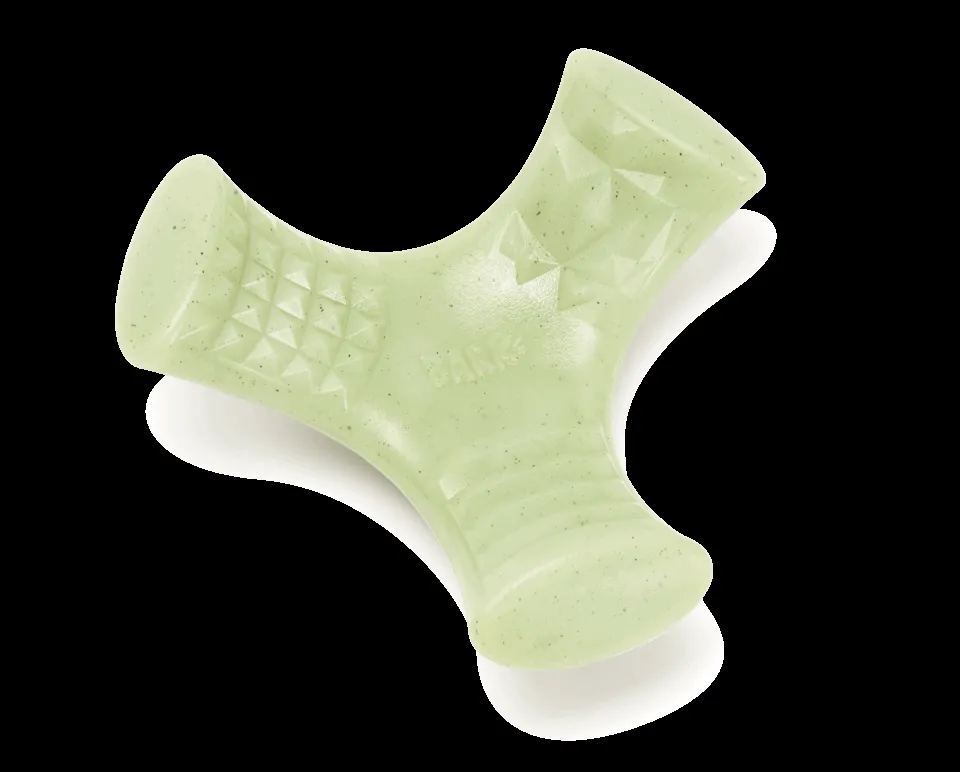 BARK Bright Dental Kit components
BARK Bright Dental Kit components
Why we recommend it:
- Includes a full month’s supply of chews and toothpaste.
- Features a triple-enzyme toothpaste for potent antibacterial action.
- Made with real chicken for palatability.
- Developed in collaboration with a leading biotech company.
- High-quality, US and Denmark-sourced ingredients.
2. Super Chewer “Chopper” Chew: A Durable Dental Toy Solution
For dogs who love to chew, the Super Chewer “Chopper” Chew offers a durable, textured toy that provides a similar mechanical cleaning action to consumable chews. This mint-scented, nylon-infused chew is designed to encourage your dog to engage in dental cleaning during playtime. It can even be enhanced by applying enzymatic toothpaste to its surface, allowing your dog to “brush” their own teeth.
Its multi-pronged shape is specifically engineered to reach various angles of the teeth, dislodging food particles and plaque. Available in multiple sizes, it’s suitable for a wide range of breeds.
Why we recommend it:
- Durable construction for aggressive chewers.
- Mint scent enhances engagement and freshens breath.
- Unique three-pronged design for comprehensive cleaning.
- Can be used with toothpaste for added benefits.
3. Virbac C.E.T. VEGGIEDENT Tartar Control Chews: Ideal for Sensitive Stomachs
Virbac’s VEGGIEDENT Tartar Control Chews are an excellent option for dogs with food sensitivities or allergies. These plant-based chews are designed to be both soft enough for comfortable chewing and firm enough to effectively scrape away plaque. A key feature is their unique “Z” shape, which increases surface contact with the teeth, maximizing cleaning efficiency and helping to freshen breath.
Beyond oral care, these chews also contain a prebiotic to support digestive health. Their meat-free composition makes them a safe and beneficial choice for dogs who react to common protein sources.
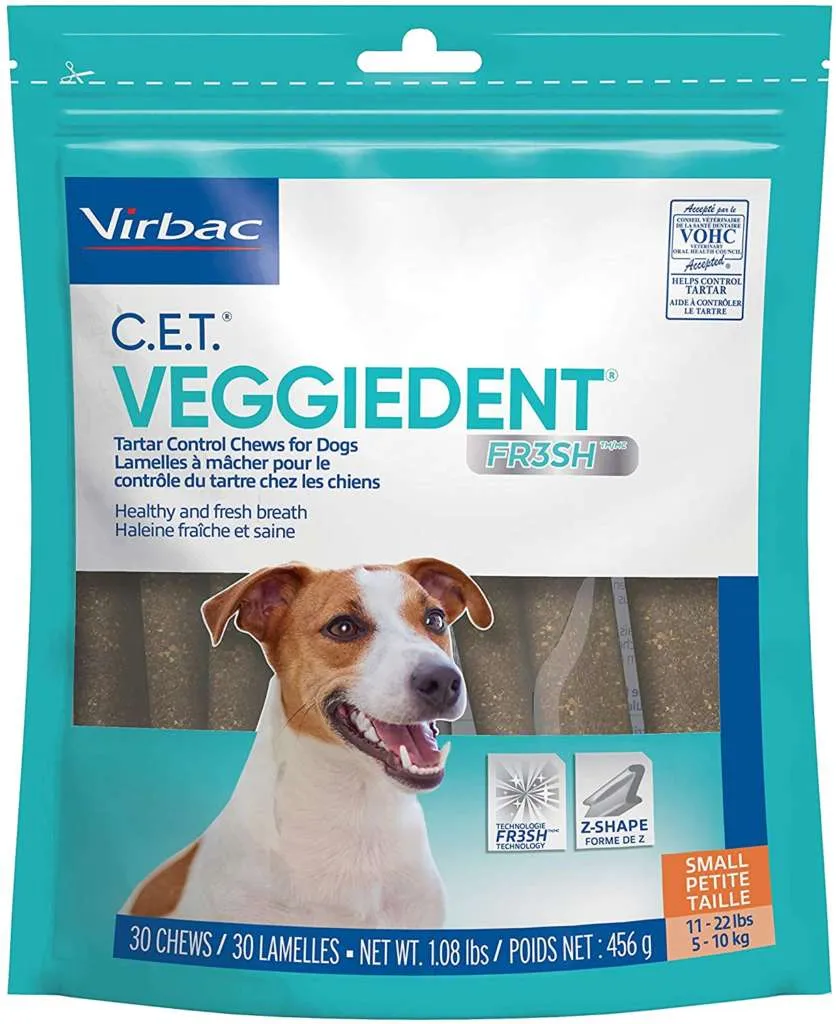 Virbac VEGGIEDENT dental chews
Virbac VEGGIEDENT dental chews
Why we recommend it:
- Effective Z-shape for superior tooth cleaning.
- Meat-free and ideal for dogs with food sensitivities.
- Includes a prebiotic to aid digestion.
- Available in various sizes to suit different breeds.
4. Benebone Dental Chew: Flavorful and Engaging
The Benebone Dental Chew is crafted for dogs who appreciate a good flavor and an engaging chewing experience. Its curved design allows for easy gripping with paws, promoting productive chewing that helps clean teeth. Infused with real bacon flavor, it keeps dogs interested, ensuring they get the most out of their dental chew time.
It’s important to note that Benebone chews are designed for chewing, not for consumption. If your dog attempts to ingest the chew, it should be replaced to ensure safety. The textured ridges are designed for maximum plaque scrubbing.
Why we recommend it:
- Made with real bacon flavor for high palatability.
- Textured ridges provide effective plaque removal.
- Ergonomic design for easy paw grip.
- Available in multiple sizes and flavors.
5. Greenies Dental Treats: A Classic and Convenient Choice
Greenies are a well-established name in dog dental care, and for good reason. These chewy, toothbrush-shaped treats are formulated to combat plaque buildup through daily chewing. They are made with natural ingredients that are easy for dogs to digest and are fortified with essential vitamins and minerals to support overall health.
Their soluble ingredients and easy-to-chew texture make them a popular choice for daily dental maintenance. Greenies are designed for consistent use to deliver the best results in freshening breath and cleaning teeth.
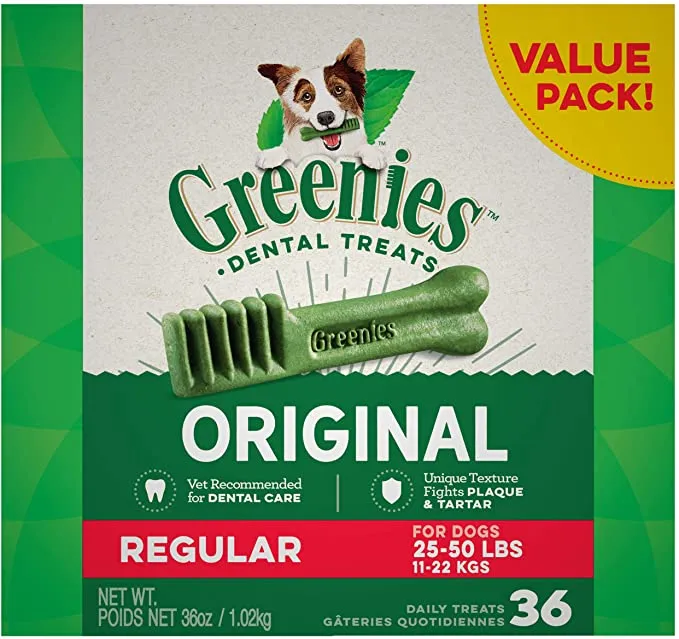 Package of Greenies Dental treats
Package of Greenies Dental treats
Why we recommend it:
- Soluble ingredients for easy digestion.
- Pleasant, easy-to-chew texture.
- Recommended for daily use to maintain oral hygiene.
- Fortified with vitamins and minerals.
Other Dental Chews and Toys We Love
Beyond our top picks, several other products offer excellent dental benefits for your dog:
Clean and Reliable Ingredients: Blue Buffalo Dental Bones
Blue Buffalo Dental Bones are shaped like dog bones and are formulated to be both delicious and beneficial for oral health. They are free from poultry by-product meal, corn, wheat, and soy. These bones contain parsley, known for its breath-freshening properties, and peas and blueberries that can aid digestion.
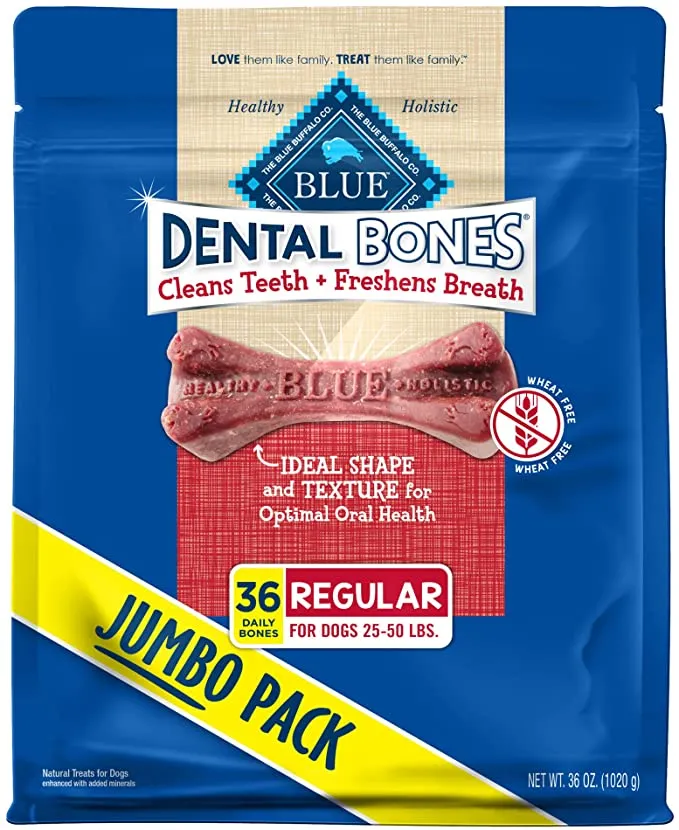 Blue Buffalo dental bones
Blue Buffalo dental bones
Why we recommend it:
- No artificial preservatives or dyes.
- Enhanced with minerals and wholesome ingredients.
- Unique shape and chewy texture contribute to cleaning.
Super Fun Shapes: Whimzees Natural Dental Chews
Whimzees are all-natural, non-GMO, and vegetarian dental chews that come in a variety of fun shapes. They effectively help clean teeth, reduce plaque, and freshen breath. These chews are an excellent choice for dogs with food allergies or sensitivities due to their meat-free composition.
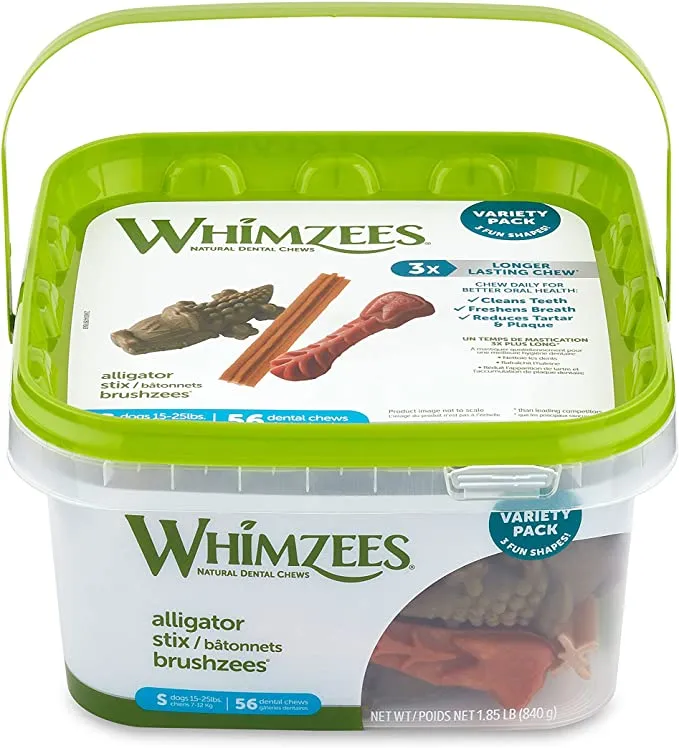 Whimzees all natural dental chews
Whimzees all natural dental chews
Why we recommend it:
- Available in diverse, engaging shapes and textures.
- Meat-free formula suitable for sensitive dogs.
- Manufactured in the Netherlands.
Pairs Great with Toothpaste: BARK Bright Dental Tool
This specially designed BARK Bright Dental Tool is made for brushing, not casual gnawing. It features reservoirs for toothpaste and natural rubber bristles that help clean teeth and distribute enzymatic toothpaste. The rocking feature adds an element of play. When used with BARK Bright’s triple-enzyme toothpaste, it effectively combats bad breath, whitens teeth, and promotes a healthier mouth.
Why we recommend it:
- Vanilla-scented for palatability.
- Toothpaste reservoir for easy application.
- Designed to scrub both top and bottom teeth.
- Available in multiple sizes.
When Do Dogs Need Professional Dental Cleaning?
While dental chews are excellent for preventative care and maintaining good oral hygiene, they are not a substitute for professional veterinary attention. If your dog exhibits any of the following signs, it’s time to consult your veterinarian for a professional dental cleaning:
- Swollen or bleeding gums
- Persistent and very bad breath
- Loss of appetite or difficulty eating/dropping food
- Excessive drooling or difficulty swallowing
- Loss of interest in chewing toys
- Visible broken or loose teeth
- Significant tooth discoloration (dark brown, black, or yellow)
It is crucial to remember that your veterinarian is the best resource for your dog’s health. Dental chews should be used as part of a comprehensive oral care routine, not as a replacement for professional veterinary treatment when it is deemed necessary.
